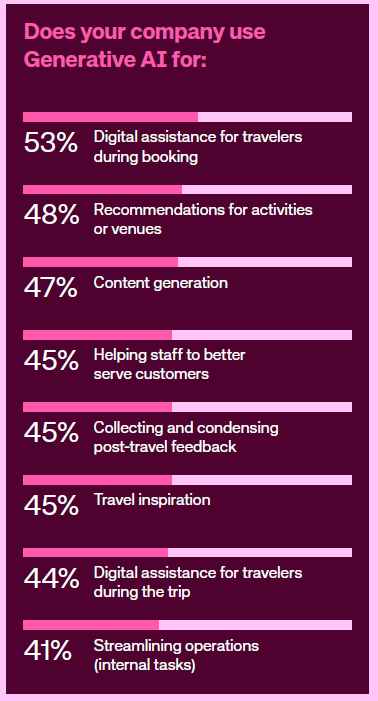The travel industry is undergoing a profound transformation thanks to the introduction of GPT Travel AI agents, which are becoming an integral part of travel planning, booking and management processes.
These intelligent systems are redefining the way travelers interact with the industry, simplifying processes, improving personalization and optimizing the overall experience.
How GPT travel AI agents are transforming tourism
By taking on repetitive tasks, handling issues in real time, and offering personalized recommendations, GPT Travel AI Agents are making travel smoother and more efficient.
Tourism companies are already using gpt travel ai agents
According to a study commissioned by the Tech Company Amadeus, over 50% of companies in the travel sector use generative AI to offer digital assistance during booking and offer personalized suggestions for activities or places of interest. This approach not only improves customer satisfaction but also increases the likelihood of conversion.
The “Navigating the future” study, conducted in collaboration with market research firm Mercure Analytics, involved a total of 306 senior technology decision makers within the travel industry. Among the results that emerged:
- 53% of tourism companies currently use generative AI to provide digital assistance to travelers during booking
- 48% use it for recommendations on activities or places to visit.
Chatbots and GPT Travel AI agents are becoming the first point of contact to handle customer inquiries, providing 24/7 support and improving overall satisfaction. These tools also reduce the workload of human staff by handling repetitive and routine tasks.

“Generative AI is no longer a ‘coming
Nicolas Hauviller
technology,’ it has arrived. From digital
travel assistants to recommendation
engines, content generation and feedback
analysis, stakeholders across the industry
are finding innovative ways to deploy this
new technique in search of an enhanced
passenger experience”.
Senior Lead Innovation
Amadeus
The main advantages of gpt travel ai agents
GPT travel AI agents can be employed in several travel industry use cases, such as:
- Personalized travel recommendations
- AI-generated itineraries
- Virtual tour guides
- Predictive analysis
- Smooth coordination between flights, accommodations and car rentals.
focus on Customization
By analyzing user demographics, travel history, booking patterns and real-time information, generative AI can create highly personalized travel plans. These itineraries take into account individual preferences, budgets, past travel behavior and even real-time suggestions, ensuring each trip is unique and tailor-made.
Key impact of gpt travel ai agents
Personalized trip planning
AI Agents are making travel more personalized than ever. By analyzing travellers’ preferences, previous trips and specific requests, these systems generate tailor-made travel profiles. Whether you prefer beachfront destinations, accommodate special dietary needs, or need proximity to fitness centers or co-working spaces, GPT Travel AI Agents can offer ideal recommendations.
Time saving and efficiency
Traditionally, planning a trip required hours of research on flights, accommodations and local activities. GPT Travel AI Agents significantly reduce this time by automatically collecting and presenting the best options within minutes. From booking flights and accommodation to organizing transportation and planning activities, these systems optimize every aspect of your trip.
Independent reservations and payments
AI travel agents are also revolutionizing the booking process, independently managing reservations and payments. These systems can book flights, accommodations and experiences based on pre-authorized spending limits, ensuring safe and seamless transactions.
Real-time problem solving
One of the most powerful features of GPT Travel AI Agents is the ability to monitor and respond to unexpected challenges in real time. Whether it’s weather events, delayed flights or overbooked hotels, AI systems can detect the problem early and provide solutions.
Improved safety and security
By integrating real-time data from weather alerts, local safety reports and health alerts, AI travel agents help travelers stay informed about potential risks during their trips.
Itinerary management
In addition to bookings, AI Agents create comprehensive and optimized itineraries, taking into account flight times, visa requirements and transportation options. These systems continuously monitor any changes or outages, offering real-time updates and alternatives.
benefits for the tourism sector
Operational efficiency
Travel agencies, airlines and accommodation providers benefit from “GPT travel” which automates tasks such as managing reservations and payment systems. This increases operational efficiency and reduces costs.
Customer satisfaction
With AI travel agents providing personalized, timely and reliable services, customers enjoy a smoother travel experience, improving loyalty and generating positive reviews.
Resource optimization
By ensuring budgets are met and time is used efficiently, AI agents help both businesses and travelers make the most of their investments.
The future of gpt travel ai agents
Experts agree that artificial intelligence represents an epochal turning point for the sector. Over 70% of companies surveyed consider this technology a top priority for the coming year. Emerging applications, such as predictive analytics, sophisticated virtual assistants and automated coordination tools, envision a future in which travel is increasingly simple, personalized and interconnected.
Companies that harness the full potential of GPT Travel AI Agents will not only stand out from the competition, but will set new standards for travelers around the world.

